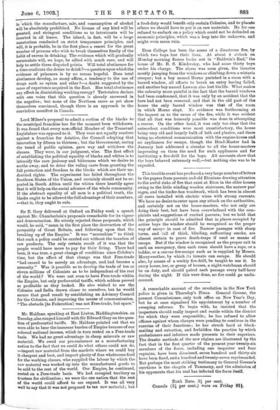Sir E. Grey delivered at Oxford on Friday week a
speech against Mr. Chamberlain's proposals remarkable for its vigour and determination. He utterly rejected those proposals, which would, he said, " mean in the first place the destruction of the prosperity of Great Britain, and following upon that the breaking up of the Empire." It was " moonshine " to think that such a policy could be carried out without the taxation of raw products. The only certain result of it was that the people would have more to pay for their living. There had been, it was true, a great change of conditions since Cobden's time, but the effect of that change was that Free-trade "had ceased to be merely an advantage, and had become a necessity." Was it possible so to develop the trade of ten or eleven millions of Colonists as to be independent of the rest of the world ? We were not even to have Free-trade within the Empire, but only preferential tariffs, which seldom proved as profitable as they looked. He also wished to see the Colonies and India drawn closer to ourselves, but he would secure that good result by establishing an Advisory Council for the Colonies, and improving the means of communication. "The obstacle [to Federationl was not Free-trade, but space."










































 Previous page
Previous page